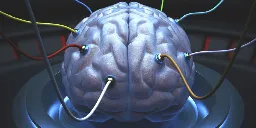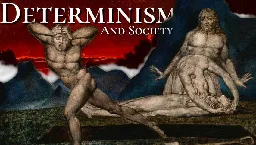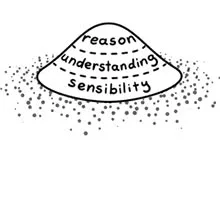Philosophy
- Does chaos theory square classical physics with human agency? | Aeon Essaysaeon.co Does chaos theory square classical physics with human agency? | Aeon Essays
Can a butterfly’s wings trigger a distant hurricane? The answer depends on the perspective you take: physics or human agency

- Philosophical theories are like good stories: Margaret Macdonald | Aeon Essaysaeon.co Philosophical theories are like good stories: Margaret Macdonald | Aeon Essays
For Margaret Macdonald, philosophical theories are akin to stories, meant to enlarge certain aspects of human life

- The bioethics of skeletal anatomy collections from India - Nature Communicationswww.nature.com The bioethics of skeletal anatomy collections from India - Nature Communications
Millions of skeletal remains from South Asia were exported in red markets (the underground economy of human tissues/organs) to educational institutions globally for over a century. It is time to recognize the personhood of the people who were systematically made into anatomical objects and acknowled...
- Who are the leaders in our heads – and how did they get there? | Aeon Essaysaeon.co Who are the leaders in our heads – and how did they get there? | Aeon Essays
How the biblical King David and Machiavelli’s Prince can help us understand the dominant view of leaders as individualists
- What The Prisoner's Dilemma Reveals About Life, The Universe, and Everything

YouTube Video
Click to view this content.
- Turing and Wittgenstein: An entanglement of math and philosophybigthink.com Turing and Wittgenstein: An entanglement of math and philosophy
In pre-War Cambridge, students had to ace an interview with Ludwig Wittgenstein to attend his lectures — Alan Turing passed that test.

- The moral imperative to learn from diverse phenomenal experiences | Aeon Essaysaeon.co The moral imperative to learn from diverse phenomenal experiences | Aeon Essays
New research is uncovering the hidden differences in how people experience the world. The consequences are unsettling

- [unanswered] What if Amish people immigrate into Europe. Would it help Europeans escape the forced “digital transformation”?
Belgian municipalities have started forcing people to use web browsers to interact with public services. That’s right. It’s no longer possible to reach a variety of public services in an analog way in some Belgian regions. And for people willing to wrestle with the information systems being imposed, it also means cash payment is now impossible when a service requires a fee. The government is steam-rolling over elderly people who struggle with how to use technology along with those who only embrace inclusive privacy-respecting technology. These groups are apparently small enough to be marginalized without government reps worrying about lost votes.
Hypothetically, what would happen if some Amish villages existed in Belgium? I ask because what’s being imposed would strongly go against their religion. Would the right to practice religion carry enough weight to compel the government to maintain an offline option even if it’s a small group of Amish? If yes, would that option likely be extended to everyone, or exclusive to the Amish?
- The Modern Wisdom Of Daoist History | NOEMAwww.noemamag.com The Modern Wisdom Of Daoist History | NOEMA
A Daoist perspective of history imparts a sense of humility on social actors as their power rises and encourages them to avoid the hubris of thinking that historical transformations are driven by some moral rationale.

- More than argument, logic is the very structure of reality | Aeon Essaysaeon.co More than argument, logic is the very structure of reality | Aeon Essays
Some have thought that logic will one day be completed and all its problems solved. Now we know it is an endless task

- Determinism vs. free will: A scientific showdownarstechnica.com Determinism vs. free will: A scientific showdown
Two books delve into what science may tell us about whether we have free will.

- Socrates: The Father of Western Philosophywww.curiouspeoples.com Socrates: The Father of Western Philosophy
For more than two millennia, the name Socrates has been synonymous with philosophy, intellectual inquiry, and the pursuit of truth.

- What is -1 to 0? A Philosophy of Ideation.blog.southparkcommons.com What is -1 to 0? A Philosophy of Ideation.
Defining a crucial stage of company-building—and why you should take it seriously.

- Everyday philosophy: Happy birthday, Albert Camuswww.theneweuropean.co.uk Everyday philosophy: Happy birthday, Albert Camus
The French philosopher and writer, born on November 7, 1913, was a publisher’s dream

- Since when is philosophy a branch of the self-help industry? | Aeon Essaysaeon.co Since when is philosophy a branch of the self-help industry? | Aeon Essays
The discipline today finds itself precariously balanced between incomprehensible specialisation and cheap self-help

- Effective Altruism: The good it promises, the harm it does (Part 1: Introduction) - Reflective altruismineffectivealtruismblog.com The good it promises, the harm it does (Part 1: Introduction)
A new collection of essays edited by Carol J Adams, Alice Crary, and Lori Gruen brings together activists and scholars from a wide range of perspectives to critically reflect on effective altruism.

- Immanuel Kant—What can we know? - Ralph Ammerralphammer.com Immanuel Kant — What can we know? - Ralph Ammer
Kant's "Critique of Pure Reason" is about what we can know—and what we can't. It explains how we look and think to understand the world.
- Effective altruism by Sam Bankman-Fried w.r.t. his political donations (dems: transparently; republicans: secretly)
cross-posted from: https://links.hackliberty.org/post/307315
> Considering Sam Bankman-Fried claimed to practice #effectiveAltruism, and the fact that he makes substantial political donations, I thought we can validate to some extent whether his effective altruism is bogus or genuine. I thought this would be easily settled. If he favors democrats, he’s putting humanity above wealth & tyranny. If republicans, the altruistic claim can be easily dismissed. > > It turns out #SamBankmanFried donated to democrats and republicans both. It’s unclear if the donations were equally effective for both parties, but interesting that he donated to dems in-the-clear while hiding donations to republicans. One of the notable donations went to a congressman who was most critical of cryptocurrency. So naturally he had to bribe that politician. > > Dems were surprised to find that he also donated to republicans (and by his own admission!). Had he donated to both parties in transparency, recipients could see their opponent is also being fed and disregard the donation (i.e. give no preferential treatment). Seeing all the recipients would reveal if there were at least a consistent ideology or philosophy in play. > > I have to conclude the political donations were likely all just to promote his own success. It does not completely nix the claim of effective altruism because he would argue it was purely a wealth accumulation endeavor as a precursor to effective altruism. But I have to say someone who is fully engaged in the idea of effective altruism would be irresistibly selective in who receives political contributions even at the cost of reduced wealth. A humanitarian would not be able to stomach the idea of financing a republican war chest. > > You also have to figure that since he chose to make dem financing transparent and repub financing in the dark, he inherently gave republican recipients full view of it. That’s only viable if he donates much more to republicans who would see that he donates mere peanuts to the opponent for optics.
- Does Determinism Rob The Human Experience of All Moral Value?tilvids.com Does Determinism Rob The Human Experience of All Moral Value?
What would a largely deterministic society look and behave like? Would it be, as some imagine, a more merciful and just society, or as some others suppose, a veritable wasteland where lawless immor...

cross-posted from: https://tilvids.com/videos/watch/52190b96-3443-483e-91ef-8b99edb3bd58
> What would a largely deterministic society look and behave like? Would it be, as some imagine, a more merciful and just society, or as some others suppose, a veritable wasteland where lawless immorality, cruelty, and hopelessness reign supreme? In this video I hope to answer this contentious question and to bring some clarity to an otherwise esoteric matter. > > > > Music: Adrift Among Infinite Stars - Scott Buckley > > > > Instagram: https://www.instagram.com/letstalkphilosophy/ > > > > Sources: > > For this particular work I have taken much from the philosopher Spinoza, the psychologist Robert Sapolsky, and the Neuroscientist/philosopher Sam Harris. I have found their insights to be extremely helpful in clarifying my own thoughts on the matter and I encourage you to read or listen to their thoughts on Determinism and free-will.
- The Philosophy of Humor: What Makes Something Funny?1000wordphilosophy.com The Philosophy of Humor: What Makes Something Funny? - 1000-Word Philosophy: An Introductory Anthology
What makes something funny? This essay reviews some theories of what it is for something to be funny.

- Do orgs that receive tax-deductible donations have an obligation as a public service to promote non-discriminatory equal access?
cross-posted from: https://beehaw.org/post/8984968
When the FSF Free Software Directory directs people to freedom-lacking places
> The #FSD purpose is to help people “find freedom-respecting programs”. Browsing the directory reveals copious freedom-disrespecting resources. For example: > > * projects jailed in MS #Github (amid substantial ethical issues) > * projects jailed in #Gitlab·com (amid substantial ethical issues) > * projects with resources (docs, forums, wikis, APIs, etc) that are jailed in #Cloudflare’s walled garden (amid substantial ethical issues) > > FSF has no tags for these anti-features. It suggests a problem with integrity and credibility. People expect to be able to trust FSF as an org that prioritizes user freedom. Presenting this directory with unmarked freedom pitfalls sends the wrong message & risks compromising trust and transparency. Transparency is critical to the FOSS ideology. Why not clearly mark the freedom pitfalls? > > The idea of having exclusive clubs with gatekeepers is inconsistent with FSF’s most basic principles, specifically: > > *
All important site functionality that's enabled for use with that package works correctly (though it need not look as nice) in free browsers, including IceCat, without running any nonfree software sent by the site. (C0)> *Does not discriminate against classes of users, or against any country. (C2)> *Permits access via Tor (we consider this an important site function). (C3)> > Failing any of those earns an “F” grade (Github & gitlab·com both fail). > > If Cloudflare links in the #FSF FSD are replaced with archive.org mirrors, that avoids a bulk of the exclusivity. #InternetArchive’s #ALA membership automatically invokes the Library Bill of Rights (LBR), which includes: > > *V. A person’s right to use a library should not be denied or abridged because of origin, age, background, or views.> *VI. Libraries which make exhibit spaces and meeting rooms available to the public they serve should make such facilities available on an equitable basis, regardless of the beliefs or affiliations of individuals or groups requesting their use.> *VII. All people, regardless of origin, age, background, or views, possess a right to privacy and confidentiality in their library use. Libraries should advocate for, educate about, and protect people’s privacy, safeguarding all library use data, including personally identifiable information.> > The LBR is consistent with FSF’s principles so this is a naturally fitting solution. The Universal Declaration of Human Rights is also noteworthy. Even if the FSD is technically not a public service, the public uses it and FSF is an IRS-qualified501(c)(3)public charity, making it public enough to observe these UDHR clauses: > > *art.21 ¶2. Everyone has the right of equal access to public service in his country.> *art.27 ¶1. Everyone has the right freely to participate in the cultural life of the community, to enjoy the arts and to share in scientific advancement and its benefits.> > These fundamental egalitarian principles & rights are a minimum low bar to set that cannot be construed as “unreasonable” or “purist” or “extremist”.Some groups of people who are excluded when resources are inside Cloudflare’s walled-garden include:
- public library users
- Tor users
- CGNAT users (often poor people in impoverished regions whose ISPs have fewer IPv4 addresses to allocate than the number of users)
- people who use scripts to access web resources (and interactive users who merely appear to be bots by using non-graphical FOSS tools, blind people IIRC as they are not loading images)
- all people with a moral objection to exposing ~20—30% of their web traffic (metadata & payloads both) to one single centralized tech giant in a country without privacy safeguards. (29% of the 200 most popular Github projects also make use of Cloudflare)
- Scientist, after decades of study, concludes: We don't have free willphys.org Scientist, after decades of study, concludes: We don't have free will
Before epilepsy was understood to be a neurological condition, people believed it was caused by the moon, or by phlegm in the brain. They condemned seizures as evidence of witchcraft or demonic possession, and killed or castrated sufferers to prevent them from passing tainted blood to a new generati...

- [answered] When exercise of rights is made conditional on use of technology, is the right violated?
cross-posted from: https://links.hackliberty.org/post/213918
> I’m increasingly encountering situations where people are forced to go through various kinds of technical hoops in order to exercise their legal rights. > > Five examples: > > ① You have a right to reserve streetside public parking in front of your house (e.g. for a week-long construction project). Historically you can go to city hall or the like, give your schedule, and pay a fee. But then they decided to put the reservation system exclusively online. Cash payers are excluded. Offline people are excluded. People who are online but do not want to share their email address with an office that uses Microsoft for their email are also excluded. > > ② You have a right to unemployment benefits. But the unemployment office goes online and forces you to solve a Google reCAPTCHA. Google’s reCAPTCHA often refuses to serve the puzzles to Tor users. People who are on clearnet may be unable to solve the CAPTCHA. Some people /can/ solve it but object to feeding a system that helps Google profit because they boycott Google. > > ③ You have a right to vote. But the voter registration process exposes your sensitive information to the tech giant Cloudflare and Amazon. Even if you register on paper, the data entry workers will expose your data to Cloudflare and Amazon anyway. > > ④ You have a right to energy access. But the energy company refuses cash payments so you are forced to open a bank account. All banks force you into a situation that goes against your beliefs. E.g. forcing you to obtain from Google a closed-source app to run on a smartphone (which you may not even have), or the bank’s website is Cloudflared and you will not share your sensitive financial info with CF. And the banks either have no analog/offline means of service, or the offline services are costly. > > ⑤ A public school excludes students who are unwilling to use Facebook, Google, Cloudflare, and Microsoft products & services. Anyone can attend but those who refuse to feed the corporate surveillance capitalists are put at a great disadvantage perhaps to the extent that they cannot pass their classes. > > Not all those examples are real. E.g. in the real life scenario of case ② I think there is an offline option (but not sure during a pandemic). So my question is hypothetical— assume there is no pathway to service except for satisfying the barriers to entry. > > The Universal Declaration of Human Rights, article 21: > > “2. Everyone has the right of equal access to public service in his country.” > > Some nuances can be extracted from the examples: > > A) You are incapable of exercising your right yourself. E.g. blind and the CAPTCHA requires vision, or you are not tech literate enough to follow the tech process. But you can hire someone to do the work for you. > > B) You are capable of exercising your rights but unwilling to accept the conditions. Hiring someone may or may not be possible depending on whether your personal conditions can be accommodated. > > So the big question is, for groups A and B: are rights being violated? > > Group B is the more interesting one. A common attitude is: those people have “preferences” and their rights are not violated when their preference is not respected. I find that quite harsh. When a right becomes conditional by the institutions who are supposed to support the right, IMO the conditions (which are not written in law) are inherently excluding people. If a right is going to be made conditional, isn’t there some kind of legal principle that the conditions be codified into law and not some arbitrary condition that a systems administrator decided was a good idea? > > #rightToBeOffline #rightToBeAnalog
- Marked by Stars: Agrippa’s Occult Philosophypublicdomainreview.org Marked by Stars: Agrippa’s Occult Philosophy
Reading Heinrich Cornelius Agrippa’s encyclopedic study of magic is like stumbling into a vast cabinet of curiosities, where toad bones boil water, witches transmit misery through optical darts, and numbers, arranged correctly, can harness the planets’ powers. Anthony Grafton explores the Renaissanc...

- Is Consciousness Part of the Fabric of the Universe?www.scientificamerican.com Is Consciousness Part of the Fabric of the Universe?
A theory called panpsychism proposes that consciousness is a fundamental aspect of reality

- 8 Techniques in Persuasion from Antiquitywww.thecollector.com 8 Techniques in Persuasion from Antiquity
Persuasive rhetorical techniques from the speeches of Demosthenes in Classical Athens to Cicero in the Late Roman Republic.

- An Explanation of Boltzmann Brains (Kurzgesagt – In a Nutshell) [10:15]
- https://piped.video/watch?v=4Stzj2_Rlo4
- https://www.youtube.com/watch?v=4Stzj2_Rlo4
> Absolutely everything you think about yourself and the universe could be an illusion. As far as you know, you are real and exist in a universe that was born 14 billion years ago and that gave rise to galaxies, stars, the Earth, and finally you. Except, maybe not.
Other explanations for Boltzmann Brains did not require an 'inside-out black hole', for example https://en.wikipedia.org/wiki/Boltzmann_brain, so this inclusion came as a surprise to me. Not sure if it's necessary.
What baffles me about the theory: If it's true, and reality is (mostly, statistically speaking) imagined ... the physical reality could be anything. It could be very different from the reality we live in. But we created our models of the universe in this one reality we know, and the theory of Boltzmann Brains emerged from that.
So based on these physical models we arrive at the idea of BBs. But if this idea is true, the physical reality could be completely different.
Or what do you think?
- Cashless shops operating i̶l̶l̶e̶g̶a̶l̶l̶y̶ (legally) in Netherlands a̶n̶d̶ (but not) Belgium; corporate disobedience
cross-posted from: https://slrpnk.net/post/1624944
(edit: from another crosspost, apparently NL shops are operating legally)
> Saw a “no cash” sign at a bakery. Conversation went like this: > > me: So, no cash? What’s going on there? > > cashier: Yeah, we’re not allowed to accept cash. > > me: Isn’t it the other way around? Isn’t there a legal tender law in #Netherlands? > > cashier: Yeah, we’re not allowed to refuse cash. > > me: So this sign posting says loud and clear “we are breaking the law”, in effect, no? Is that not being enforced? > > cashier: That’s right. It’s unenforced in Netherlands. > > The same thing is happening in #Belgium. This kind of forces me to revise my understanding of European culture & norms. In both the US & Europe there is a culture of certain laws (rightfully) going unenforced against individual natural people. E.g. small amounts of marijuana possession. But I previously thought when it came to moral/legal people (businesses), they simply complied with the law in Europe to a great extent. > > IOW, companies complied with laws in Europe. Contrast that with the US where corporations small and large will blatantly disregard any laws that interfere with profit based on the calculated risk of getting caught and risk of penalties. > > I just wonder if Europe is being influenced by cavalier US corps and changing to comply only when penalties are likely. Or is this something I had wrong all along.. that EU companies were always loose with compliance? > > #WarOnCash
update --- The original post was censored without reason by @knollebol4 @nlemmy.nl. It’s now a non-existent node, perhaps rightfully so if it’s going to use an anti-spam tool against ideas.
- Aristotle on the Nature of Memorywww.thecollector.com Aristotle on the Nature of Memory
How does Aristotle distinguish memory from recollection, and how does his theory of memory relate to his theory of mind at large?

- To Sanitize the Master’s Corpus: On the Heidegger Hoaxlareviewofbooks.org To Sanitize the Master’s Corpus: On the Heidegger Hoax
Richard Wolin shows how Martin Heidegger’s literary executors manipulated his manuscripts to disguise and downplay the philosopher’s antisemitism....

- Why Richard Feynman (the Superstar Physicist) Hated Philosophy and Philosophersmedium.com Why Richard Feynman (the Superstar Physicist) Hated Philosophy and Philosophers
Richard Feynman called philosophy “low-level baloney” and philosophers “pompous fools” who make “stupid remarks”. He also said that…

- To Build Truly Intelligent Machines, Teach Them Cause and Effect | Quanta Magazinewww.quantamagazine.org To Build Truly Intelligent Machines, Teach Them Cause and Effect | Quanta Magazine
Judea Pearl, a pioneering figure in artificial intelligence, argues that AI has been stuck in a decades-long rut. His prescription for progress? Teach machines to understand the question why.

- Philosopher of Pessimismyoutube.com Philosopher of Pessimism
A short clip of Bryan Magee discussing the famous pessimism of the thought of Arthur Schopenhauer in an interview with Frederick Copleston. This comes from a...

- Public Exposure by Daniel W. Graham
Socrates sought out those with reputations for wisdom. Who were the wise men he interviewed?


